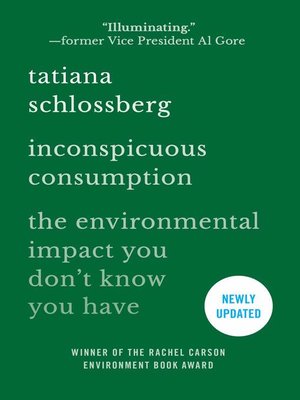Pulling The Climate Thread
Most Americans are concerned about changes to the climate. The percentage of folks paying attention has been steadily climbing over the decades, in sync with rises in temperatures and episodes of extreme weather. So we now know more. But what can one individual do? Is it possible to be an informed “green” consumer, to live an ethical life that does not unduly contribute to climate change?
It’s an extraordinarily difficult question to answer as I learned in Tatiana Schlossberg‘s engaging book, Inconspicuous Consumption: The Environmental Impact You Don’t Know You Have. Schlossberg is a science journalist who writes for the mainstream press and did a stint as an environmental reporter for the New York Times. Her first book, Inconspicuous Consumption is a rambling effort that nevertheless finds a way to strike home. It won awards and for good reasons. Schlossberg loves details and her cheerful curiosity that loves to dig deeper renders her a complete guide to gaining an appreciation of the complexity of modern life and its impact on the environment. She aims to inform and to do so in a way that does not overwhelm – all the while making sure that the reader appreciates the absence of easy solutions. That is a difficult and impressive line to walk.
The book is organized into four sections: Technology and the Internet; Food; Fashion, and Fuel. For each, Schlossberg writes in the first person, sometimes intimately, about her questions and the difficulty in untangling environmental issues from those of economics, culture, politics, business, history, and much more. The internet, as an example, can be an extraordinarily inefficient consumer of energy. Schlossberg provides some history (power lines following telegraph lines, which in turn were strung to follow the railroads) as well as laws, policies and economics that create our current state of affairs. That’s just the internet as a physical thing. Schlossberg moves beyond direct costs to explore internet consumption and delivery. This relative new way of shopping has led to all manner of changes – in business, in supply, in patterns of consumption. The number and cost of consumers returning goods has soared. Consumption extends to viewing, too, and I learned that Netflix accounts for 15% of all internet bandwidth.
Schlossberg researches “common sense” rules as well. For example, when it comes to food, buying local does not necessarily reduce the carbon footprint. Some foods are more “green” when they are single source and shipped large distances. Polyester and cotton are both made with significant back end energy costs. Pick the subject and Schlossberg effectively problematizes it, highlighting the deep interconnectedness and complexity of the modern economy.
While all that may feel overwhelming, a difficulty Schlossberg acknowledges up front, she also works to humanize her quest for better understanding. This is a book with many asides and direct appeals, from writer to reader. If she is stumped, she tells us – just as she lets us know when facts depress or intrigue her. There’s a cheerfulness to her account that is sometimes in conflict with the information she imparts. More than anything else, Schlossberg wants us to comprehend that climate change is about everything we do as humans. If we grasp this, we will be much farther along in talking about it, appreciate it, and be willing to look for answers about how to lead a more just life.
An ambitious agenda – and well worth considering.
David Potash
